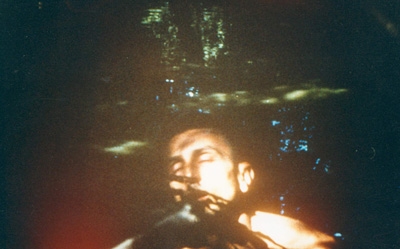
2000, France/Italia, S16 mm on DVD, colour, sound, 7 min.
After Raymonde Carrasco that invented the etnographic poem, Marico Valente, on a neapolitaine dance, invented the experimental antophologic poem.
Nicole Brenez
The changing from cinematograph to cinema has turned to a historical pace in which the beauty of technicality has become an industrial device of production of fantasies. This process is not total, because from the beginning, cinema has always come back to its source to catch its breath again and gain a new energy. Each time that narrativity became stereotypes, technicality boosted the medium in its whole form. Since la Sirène or Polichinelle en liberté up to Evhoé or Esciué, Maricò Valente's work has tried to keep this truth in mind. The industry of cinema balanced with the technicality of the medium cinematograph, its double origin of productive process and enjoying and delightful art. For example, shots from Esciué seem first have the shape of its plot, but, moving forward, the rhythm run faster to become obsessive melody, synesthetic sounds and images, primitive choreical ritual.
Ethnologists have worked on good influences of choreical dances - well spread in the south of Italy - where brisk, unintentional and jerky movements, as well as it creates a close feeling with nature, push bad spirits out of bodies. Thanks to this ancestral knowledge, her Neapolitan roots and her studies of anthropology, Maricò Valente has widely emphasised her imaginary with archetypes bound with singular form of dance: the filmmaker describes in details the drunkenness she gives in the darkness of wood or the sudden rise of flow. The Maricò Valente's work, far from a description of a documentary reality from outside, tries to get us into the direct experience of a ritual of delight which is linked both with a technicality as mythical Pharmakon and the cinema as a material producing emotions.
Carlo Grassi
Jeune, dure et pure. Une histoire du cinéma d'avant-garde et expérimental en France Cinémathèque Française/Mazzotta
